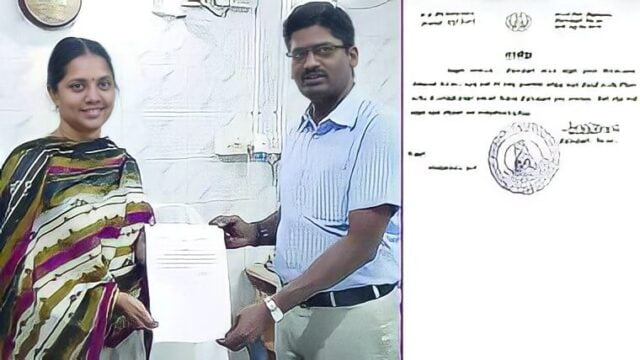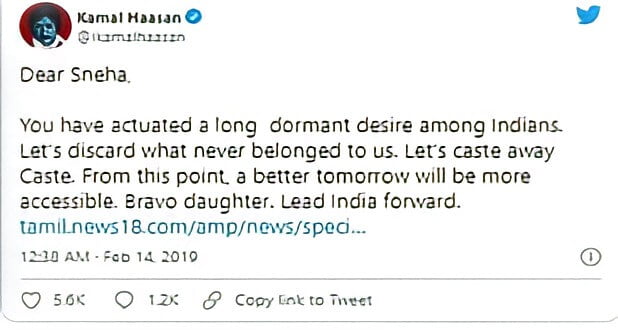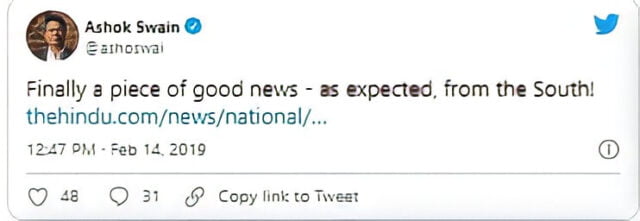On February 5th, Sneha Parthibaraja, a 35-year-old lawyer from Vellore became India’s first citizen to have a ‘no caste, no religion’ certificate. She had been fighting for her right to have an identity exclusive of caste and religion for 9 years.

Throughout school and college, her family decided to leave the column of caste and religion blank, stating that her identity as an Indian was self-sufficient. Her birth certificate too had the same columns blank.
Sneha got repeatedly turned down by officials whenever she filed for the certificate and so, in 2017, while filing her last application, she told the officials that she did not want any subsidy or reservation and hence wanted to remove the caste and religion status from her being.
Sub-Collector, Tirupattur, B. Priyanka Pankajam finally decided to give her the ‘no caste, no religion’ identity certificate stating, “Though we found no precedent, we decided to go ahead and certify her as it will not affect anybody or take away another person’s opportunity.”
Celebrities started congratulating Sneha on this commendable act and many drew inspiration from this revolutionary who fought for her right and took an initiative towards an India where no person is out listed or discriminated against based on their caste and religion.


Read More: Why Is #RemoveUsFromScheduleCaste Trending Today?
How Is This Step A Big Deal?
Despite being constitutionally abolished in the 1950s, discrimination based on caste continues to this date. Socially outcasting, bullying, and depriving the ones with ‘lower’ castes remains a major part of India, especially rural India.
Many people have misguided notions about castes in their minds wherein they refer to themselves as superior beings when in reality, caste has nothing to do with it. The origin of the caste system dates back to the Aryans who, in goodwill, tried organizing society into castes/groups to carry out various tasks in an orderly manner.
Meant to be just a form of social stratification, castes have come a long way to being misinterpreted and used according to the whims and fancies of those bent on ruining the unity and the centuries-long peace that had prevailed.
Dr. B.R. Ambedkar did all that he could to eliminate caste-based discrimination in India and help the citizens look above these petty differences. UN Committee on the Elimination of Racial Discrimination (CERD) too, has been working extensively towards the implementation of laws that abhor such malpractices.
As for religion, India is the land of diversity that has stayed united despite the presence of frictional forces at play. But being the center of wealth and all sound literature under the sun, India has attracted various invasions which have resulted in the currently endangered state of harmony and unity.
Communal violence has been, time and again, been observed all around the nation and continues to perpetrate across different communities that seek different ways to solve or overpower others.
This calls for a collective decision to condemn all notorious acts based on caste and religion and for steps towards a peaceful, harmonious, and united nation. We need to think big, to seek pride in being an Indian above all, and honestly, what need is there for stating caste and religion, aside from discriminatory purposes?
Why can’t we mind our religions and castes without shouting out to the nation or forming communal groups that put us in a box?
Image Sources: Google Images, Twitter
Sources: News18, The Hindu, Economic Times
Find The Blogger: @evidenceofmine
This post is tagged under: Tirupattur, Sneha Parthibaraja, India, Indian lawyer, Vellore, TN, Tamil Nadu, no caste, no religion, India’s first, identity, certificate, no caste no religion certificate, caste, religion, castes in India, religions in India, court, HC, SC, Indian court, petition, application, court officials, subsidy, reservation, B. Priyanka Pankajam, precedent, law, Indian laws, Indian celebrities, celebrities, Kamal Haasan, discrimination, caste based discrimination, oppression, injustice, justice, law and order, government, government of India, abolished, constitution, constitution of India, lower castes, BPL, upper castes, hindu, muslim, sikh, christian, buddhist, brahmin, kshatriya, vaishya, shudra, untouchanbles, harijans, caste system, caste system in India, rural India, Aryans, rulers of India, social order, social stratification, division of labor, Dr. B. R. Ambedkar, UN, United Nations, CERD, Committee on the Elimination of Racial Discrimination, law implementation, diversity in India, diversity, unity, India’s unity, India’s sovereignty, communal violence, community, Indian communities, communal riots, peace, harmony, Sumanth Raman, Ashok Swain, India’s first woman to get no caste no religion certificate, what is no caste no religion certificate, India’s first citizen to get no caste no religion certificate
Other Recommendations:
FlippED: Our Bloggers Argue Whether Religion Hinders Rational Thinking































